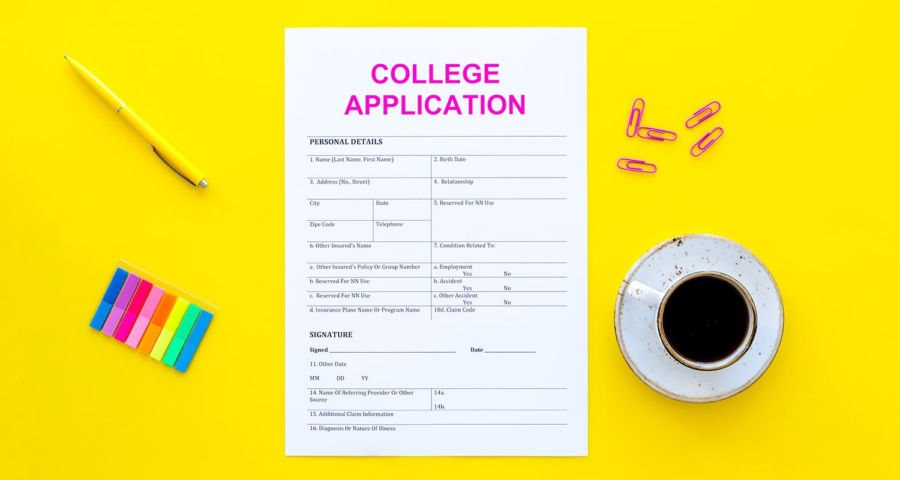College Applications 101: Five Seniors Share Their Experiences
June 12, 2021
The Students
Elie: My name is Elie Weitzman and I’m going to Washington University in St. Louis. I’m currently undecided on my major, but I’m leaning towards political science right now.
Simin: I am Simin Mavani, and I hope to major in business administration at the University of California, Berkeley.
Kwasi: My name is Kwasi Osei-Amankwah. I’ll be attending the University of Connecticut and majoring in journalism (and maybe sports management).
Juliana: Hello, my name is Juliana Perez and I am committed to Fordham University. I chose the Rose Hill Campus, and I will be dorming there for my 4 years. I am currently undecided, but I am leaning towards psychology or a pre-law track.
Shehreen: I am Shehreen Siddiqui and I am committed to Emory University. I’m not sure what I’m going to major in, but I’m leaning towards biochemistry.
The Interview
Q1: How did you choose your college list? What were some factors that influenced which schools you ultimately applied to?
Elie: I was lucky enough to be able to visit some schools before COVID hit, so I had a pretty good idea of which schools I was still interested in and which schools to stay away from. Overall, there was no single factor that made me decide the most. Location was a big one for me, and obviously if I enjoyed the visit I considered the college more heavily as well. That being said, at the end of the day my choices were based on an amalgamation of factors, from opportunities in my areas of interest to the options available for various extracurriculars.
Simin: I was sure of what I wanted to do in the future, and I didn’t really care about location or size, so I applied to all types of locations. The most important thing I considered was the school’s business program and the strength of professors for future connections. Alumni network and brand name matter in the business field, so prestige was ultimately a factor, though this may sound a little braggish. My other reserve was the presence of sororities—I did not want to go to a school where sororities had a big influence. I’m glad I ended up in the diverse metropolis of California. I don’t think another school would have been more fitting.
Kwasi: I really wanted to go to a school where they play division one sports because I’m interested in sports journalism, so I was thinking about a lot of schools like Texas A&M and UT Austin. In the end, I thought that I should stay somewhat close to home, and I chose schools based on the strength of their journalism and sports management programs.
Juliana: One big factor this year was distance from home for me. Especially because of Covid and the uncertainty of the future, I chose schools that would be easier to travel to versus colleges where I had to take a plane, in case my school had to shut down or go remote. Some other factors that were a must for me were study abroad programs, sports teams (specifically, soccer and track), and the amount of clubs or volunteering programs. I love traveling, being active, and volunteering, so I only applied to colleges that had all 3 available.
For me school size wasn’t a huge factor but it was still something to keep in mind. If you know you learn better when the class is smaller, definitely look into the size of the undergraduate class and also the student to teacher ratio.
If you already have an idea of what you’d like to study, definitely see if it is available at your college. See if they have a strong program in the fields that you are interested in. See which majors they are strongest in or known for. If you are undecided, maybe choose a college with many majors so you have more options.
Shehreen: I chose my college list based on which schools were strongly suited towards STEM subjects, since I found myself interested in most of my science and math classes in high school. I also prioritized schools that had relatively bigger campuses and multitudes of internship opportunities.
Q2: How did you figure out what you wanted to study?
Elie: I really find politics to be something I’m passionate about. I know for a fact that even if I don’t choose political science, I will be choosing something related to politics in some way, but it really has nothing to do with career interests or anything like that. It’s more that I know this is something I want to be involved in for the rest of my life regardless of my job.
Simin: Honestly, the classes I took in high school made me sure I did not want to do something STEM-related as my main focus. I was always a stronger humanities student, but I wanted my major to be one where I wouldn’t struggle with finding a job. My parents are business owners, so I was already introduced to that concept, but I didn’t want the stress of owning my own stores and managing them. So, I decided on the business firm life—at least for now. My minors will probably be computer science and media studies because technology is the future and integrating it with business prepares a strong entrepreneurial mindset.
Kwasi: I’ve always had a passion for writing, so it wasn’t really that hard for me to figure out what I wanted to major in. I just knew that I wanted to get paid to talk about something that I was passionate about, and I hope that I can make it in journalism.
Juliana: I’m leaning towards psych because I love working with people, and I have a great interest in crime and what goes on in the minds of criminals. That’s where pre-law comes in—I’m not necessarily interested in being a lawyer, but I want to be in a field that’s related to crime. The two tie together. Ultimately, I want my job to be primarily focused on helping people.
Shehreen: During high school, I found myself excelling more so in my STEM classes than social studies and English classes. I also enjoyed studying for those subjects willingly and didn’t feel like I was pushing myself to. I interned at labs over summers and appreciated the work that went into daily life at the laboratory. I chose the major that best aligned with my interests and is versatile for many career paths.
Q3: How did you decide which school to commit to?
Elie: I got to visit WashU in February of junior year and absolutely loved it. I got a tour from a friend, which gave me a much more up-close-and-personal look at the school, and then did my research on my own and felt like it was just the right choice to make. They had extracurricular activities I saw myself participating in, classes I found interesting, and the kids there just felt like my type of people.
Simin: I had a pretty hard college process because my first ten schools were basically rejections and waitlists. So my options came down to two California schools and one closer to home. I weighed out my options (the quality of the program, diversity, location for internships), and even though I did not imagine being so far from home, it came down to Berkeley. The other schools were on the opposite extremes: one lacked diversity and focused too much on social life, whereas the other was quiet and seemingly very stressful. Berkeley was right in the middle. I guess you could call it the Goldilocks method.
Kwasi: I think the main reason why I wanted to go to UConn was because I wanted to get away from everything that was going on in New York. I didn’t want to stay locally because I didn’t want to drive to school every day. I figured I’d try something new, and if I didn’t like UConn, I could always transfer.
Shehreen: I decided to commit to Oxford College at Emory University because it’s a small liberal arts school in a big city; The smaller size of the school allows for more available leadership positions, and the location guarantees more exposure and job opportunities in various fields of study. I was attracted to their liberal arts education because it allows the student to explore their interests for two years until they decide on what subject best fits their desired lifestyle. Emory is also in a more temperate climate and liberal part of the United States.
Q4: What is one thing you’d do differently if you could relive your application process? Or, what is something you wish you knew before applying to college?
Elie: Definitely spend less time on it. I know that sounds very counterintuitive, but looking back, I feel like I spent so much time doing trivial, useless things to ease my stress, which took away from my enjoyment of the process and worsened my mental health. I’d 100% never go on College Confidential or spend that extra ten minutes altering one word in a two-page long essay when I could’ve just taken some time to myself.
Simin: I am a first generation student, so I did the whole process on my own. Of course, I had people read my essays and guide me, but it’s not the same as having people constantly around you giving you a step-by-step guideline. My biggest mistake was not starting early enough. I felt a little delayed in my process and should have started in the summer, and part of the reason was because I was preoccupied with my worries of taking my SAT’s, since the tests kept on being cancelled because of COVID-19. However, I am thankful for the test optional policy that came out of this global pandemic because I am not a test taker, and this college process really taught me that getting into college is bigger than just the numbers. That is the idea I would like to highlight because I am not perfect on paper, but I got into my DREAM school.
Kwasi: I wish I could go back in time and take school more seriously because there’s a lot of things that I could’ve done back then that probably would’ve helped my college application process. However, I’m also happy with where I’m at right now.
Juliana: I don’t really regret anything, and I was super prepared for the process.
Shehreen: I would apply to more target schools. My list was composed of extremes: reach and safety schools, which made the admissions process unpredictable and more stressful than necessary for me. Standardized testing was so emphasized throughout high school, but it was only a menial part of the applications this year, so I wish I invested more energy in making a difference in my community instead of spending endless hours cramming for tests. I’ve learned that the outcomes in life always end up becoming what you make it to be; I don’t regret what I spent my time doing in high school because I enjoyed every second of it and got accepted into a school I’m happy about.
Q5: What’s the most helpful advice you received?
Elie: You only need one school. You’re not going to every school you get into. At the end of the day, your pride should be derived from your pride in the school you attend, not the ones you get into. After this entire process was over, I still hadn’t heard from more than half of my schools because I committed early, and it really made no difference. Don’t stress about how many schools you get into, just stress about getting into the right one.
Simin: This is a shout out to Ms. Hastings, but practice mindfulness, meditation or something to take your mind off of the college process. I get anxious easily, and I thought submitting my apps and getting them done would be the worst part, but instead, it was the waiting game. You have to wait weeks, if not months, for your results to come back, and those months were by far the most difficult months of my high school experience. So, do something you have been waiting to do or just focus on yourself. Binge that Netflix show if you want to, take a mental health day or two. Just prioritize yourself because in the long run you will thank yourself for not burning out.
Kwasi: Do what is important to you. Pursue something that you can see yourself doing in the next 5 to 10 years.
Juliana: Find a college that is cut out for you and one that will help you succeed. Make sure to do some research before just adding it to your list blindly, and don’t just apply because it has a good name or because everyone goes there. You shouldn’t be ashamed if your college isn’t a “popular” college or if you don’t end up going where everyone else is. I know it’s hard, especially at this school where almost anything is a competition, but do what is best for you and try not to think about what others will think about the college you choose.
Shehreen: Colleges are just like material goods. It does not define you. Be the best version of yourself at whatever college you commit to because there are different roads to success, not only the Ivy League road.
Q6: Any last tips for applying to college?
Elie: Good luck! This entire process is completely out of your hands. Just prepare for the worst, hope for the best, and try to enjoy yourself a little bit along the way. Essay writing doesn’t have to be a bore.
Simin: Look for scholarships early. I emphasize this because colleges are pretty bad with financial aid and gift aid (any type of aid, really). I promise you that if you start the search early and use the summer going into senior year to your advantage, you will feel a lot more relieved. College is an expensive business, so it’s best to do what you can to not suffer in student loans for the next ten years of your life. I wish all of you the utmost luck in your college application process!!!
Kwasi: Just look deep inside your heart and ask yourself what do you want to do with your life. Be honest. You can ask your family and ask your friends, but in the end, the decision comes down to you yourself.
Juliana:
1) Make sure to stay on top of the deadlines for essays and supplements.
2) Stay organized and on schedule so you don’t leave things for the last minute.
3) Remember that colleges can see your social media and keep that in mind when posting videos and pictures.
4) Apply to reach, target and safety schools. Do not leave yourself with only 2 options after applying to 20 schools. I have a lot of friends who did that and ended up disappointed this year.
5) Start your research early and take campus tours.
Shehreen: Apply to as many as you can while putting an equal effort into all of your applications. You want as many options as you can get at the end of the day.





